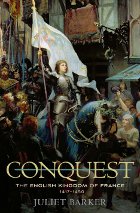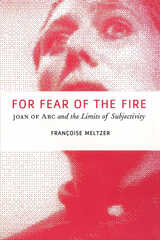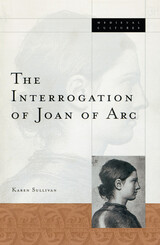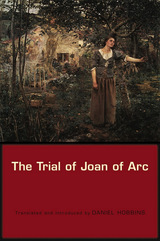
For thirty dramatic years, England ruled a great swath of France at the point of the sword—an all-but-forgotten episode in the Hundred Years’ War that Juliet Barker brings to vivid life in Conquest.
Following Agincourt, Henry V’s second invasion of France in 1417 launched a campaign that would place the crown of France on an English head. Buoyed by conquest, the English army seemed invincible. By the time of Henry’s premature death in 1422, nearly all of northern France lay in his hands and the Valois heir to the throne had been disinherited. Only the appearance of a visionary peasant girl who claimed divine guidance, Joan of Arc, was able to halt the English advance, but not for long. Just six months after her death, Henry’s young son was crowned in Paris as the first—and last—English king of France.
Henry VI’s kingdom endured for twenty years, but when he came of age he was not the leader his father had been. The dauphin whom Joan had crowned Charles VII would finally drive the English out of France. Barker recounts these stirring events—the epic battles and sieges, plots and betrayals—through a kaleidoscope of characters from John Talbot, the “English Achilles,” and John, duke of Bedford, regent of France, to brutal mercenaries, opportunistic freebooters, resourceful spies, and lovers torn apart by the conflict.

Engaging a number of theorists, and alternating between Joan's historical and cultural context, Meltzer also explores the ways in which postmodern thinkers question subjectivity. She argues that the way masculine subjects imagine Joan betrays their fear of death and necessitates the role of women as cultural others: enigmatic, mysterious, dark, and impossible. As such, Joan serves as a useful model of the limits and risks of subjectivity. For Meltzer, she is both the first modern and the last medieval figure. From the ecclesial jury that burned her, to the theorists of today who deny their attraction to the supernatural, the philosophical assumptions that inform Joan's story, as Meltzer ultimately shows, have changed very little.


No account is more critical to our understanding of Joan of Arc than the contemporary record of her trial in 1431. Convened at Rouen and directed by bishop Pierre Cauchon, the trial culminated in Joan's public execution for heresy. The trial record, which sometimes preserves Joan's very words, unveils her life, character, visions, and motives in fascinating detail. Here is one of our richest sources for the life of a medieval woman.
This new translation, the first in fifty years, is based on the full record of the trial proceedings in Latin. Recent scholarship dates this text to the year of the trial itself, thereby lending it a greater claim to authority than had traditionally been assumed. Contemporary documents copied into the trial furnish a guide to political developments in Joan's career—from her capture to the attempts to control public opinion following her execution.
Daniel Hobbins sets the trial in its legal and historical context. In exploring Joan's place in fifteenth-century society, he suggests that her claims to divine revelation conformed to a recognizable profile of holy women in her culture, yet Joan broke this mold by embracing a military lifestyle. By combining the roles of visionary and of military leader, Joan astonished contemporaries and still fascinates us today.
Obscured by the passing of centuries and distorted by the lens of modern cinema, the story of the historical Joan of Arc comes vividly to life once again.
READERS
Browse our collection.
PUBLISHERS
See BiblioVault's publisher services.
STUDENT SERVICES
Files for college accessibility offices.
UChicago Accessibility Resources
home | accessibility | search | about | contact us
BiblioVault ® 2001 - 2024
The University of Chicago Press









